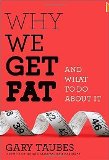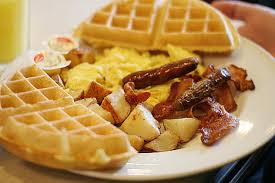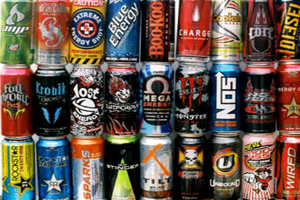February 2nd, 2011 by Harriet Hall, M.D. in Book Reviews, Opinion
1 Comment »

 Journalist Gary Taubes created a stir in 2007 with his impressive but daunting 640-page tome Good Calories, Bad Calories. Now he has written a shorter, more accessible book Why We Get Fat: And What to Do About It to take his message to a wider audience. His basic thesis is that:
Journalist Gary Taubes created a stir in 2007 with his impressive but daunting 640-page tome Good Calories, Bad Calories. Now he has written a shorter, more accessible book Why We Get Fat: And What to Do About It to take his message to a wider audience. His basic thesis is that:
– The calories-in/calories-out model is wrong.
– Carbohydrates are the cause of obesity and are also important causes of heart disease, type 2 diabetes, cancer, Alzheimer’s, and most of the so-called diseases of civilization.
– A low-fat diet is not healthy.
– A low-carb diet is essential both for weight loss and for health.
– Dieters can satisfy their hunger pangs and eat as much as they want and still lose weight as long as they restrict carbohydrates.
He supports his thesis with data from the scientific literature and with persuasive theoretical arguments about insulin, blood sugar levels, glycemic index, insulin resistance, fat storage, inflammation, the metabolic syndrome, and other details of metabolism. Many readers will come away convinced that all we need to do to eliminate obesity, heart disease and many other diseases is to get people to limit carbohydrates in their diet. I’m not convinced, because I can see some flaws in his reasoning. Read more »
*This blog post was originally published at Science-Based Medicine*
January 22nd, 2011 by Toni Brayer, M.D. in Health Tips, Research
2 Comments »

 Haven’t we all learned that breakfast should be our biggest meal? “Start the day with ‘fuel’ and you can burn it off as the day goes on.” “Eat a big breakfast and you’ll eat fewer calories all day long.”
Haven’t we all learned that breakfast should be our biggest meal? “Start the day with ‘fuel’ and you can burn it off as the day goes on.” “Eat a big breakfast and you’ll eat fewer calories all day long.”
This advice is probably not true, and in fact a new study published in the January 17th issue Nutrition Journal shows that people ate the same at lunch and dinner regardless of what they had at breakfast. If a person ate 1,000 calories at breakfast (which is easy to do with bacon, eggs, toast, hashbrowns, and juice), he or she had a total increase in calories eaten throughout the day by 1,000 calories.
This doesn’t mean we should be skipping breakfast. The problem may be what we historically think of as an “American” breakfast. It might have worked for the farmer in the past or the laborer hauling lumber, but it’s just too many calories for our current level of activity. Read more »
*This blog post was originally published at EverythingHealth*
January 11th, 2011 by Toni Brayer, M.D. in Better Health Network, Health Tips
No Comments »

 As part of the new healthcare legislation (Affordable Care Act), the FDA has now published its guidelines for restaurants to inform consumers of the calorie counts of food. It establishes requirements for nutrition labeling of standard menu items for chain restaurants and chain vending machine operators.
As part of the new healthcare legislation (Affordable Care Act), the FDA has now published its guidelines for restaurants to inform consumers of the calorie counts of food. It establishes requirements for nutrition labeling of standard menu items for chain restaurants and chain vending machine operators.
This is important because Americans now consume an estimated one-third of their total calories from foods prepared outside the home. Consumers are generally unaware of the number of calories they consume from these foods, and being overweight or obese increases the risk of a number of diseases including heart disease, type 2 diabetes, stroke, and cancer.
Here’s what the guidelines say:
— Restaurants with 20 or more locations must disclose the number of calories in each standard menu item on menus and menu boards (have 19 chain locations? You get a pass. Daily specials also get a pass.)
— Additional written nutrition information must be available to consumers upon request (total fat, saturated fat, cholesterol, sodium sugars, carbs, fiber, protein, etc.)
— The menu must say that the additional nutritional information is available. Read more »
*This blog post was originally published at EverythingHealth*
January 9th, 2011 by admin in Better Health Network, Health Tips
No Comments »

 By Scott Gavura, BScPhm, MBA, RPh for Science-Based Medicine
By Scott Gavura, BScPhm, MBA, RPh for Science-Based Medicine
My stimulant of choice is coffee. I started drinking it in first-year university, and never looked back. A tiny four-cup coffee maker became my reliable companion right through graduate school.
But since I stopped needing to drink a pot at a time, an entirely new category of products has appeared — the energy drink. Targeting students, athletes, and others seeking a mental or physical boost, energy drinks are now an enormous industry: From the first U.S. product sale in 1997, the market size was $4.8 billion by 2008, and continues to grow. (1)
My precious coffee effectively has a single therapeutic ingredient, caffeine. Its pharmacology is well documented, and the physiologic effects are understood. The safety data isn’t too shabby either: it’s probably not harmful and possibly is even beneficial. (I’m talking about oral consumption — no coffee enemas. Please.) In comparison, energy drinks are a bewildering category of products with an array of ingredients including caffeine, amino acids, vitamins, and other “natural” substances and assorted “nutraceuticals,” usually in a sugar-laden vehicle (though sugar-free versions exist). Given many products contain chemicals with pharmacologic effects, understanding the risks, signs of adverse events, and potential implications on drug therapy, are important.
So are energy drinks just candied caffeine delivery systems? Or are these syrupy supplements skirting drug regulations?
The Message
The ads are seductive. Who doesn’t want more energy? Who doesn’t want their mind and body “vitalized?” And don’t we have time-starved lifestyles? Initially envisioned for athletes, energy drinks are now marketed mainly towards teens and young adults, where uptake has been dramatic. Cross-promotion with extreme sporting events, and creating names like “Full Throttle,” “Rockstar,” and even “Cocaine” burnish the “extreme” image. The market is now segmented further with products targeted at women, vegetarians, diabetics, celiacs, and more. However you identify yourself, there’s probably an energy drink developed with you in mind. Read more »
*This blog post was originally published at Science-Based Medicine*
January 9th, 2011 by Glenn Laffel, M.D., Ph.D. in Better Health Network, Health Tips, News, Research
1 Comment »

 Just about everybody agrees that kids should eat breakfast every day. Breakfast improves their overall nutrition and their performance in school, among other things. But how helpful can breakfast really be if it consists of cereal deluged in sugar?
Just about everybody agrees that kids should eat breakfast every day. Breakfast improves their overall nutrition and their performance in school, among other things. But how helpful can breakfast really be if it consists of cereal deluged in sugar?
“Not very” is the answer.
Thankfully, a new study by Jennifer Harris and colleagues at Yale suggests that kids are perfectly willing to consume low-sugar cereals instead, particularly if they can add a pinch of table sugar or fresh fruit to the mix.
To evaluate kids’ willingness to eat low-sugar cereals, Harris’ team randomized 91 kids between the ages of five and 12 to two groups. Kids in the first group were offered low-sugar cereals like Cheerios, Corn Flakes, and Rice Krispies, which contain one to four grams of sugar per serving. Kids in the other group chose between Cocoa Pebbles, Frosted Flakes and Fruit Loops, which contain about 12 grams of sugar per serving.
Kids in both groups were also offered orange juice, 1 percent milk, pre-cut sections of bananas and strawberries, and sugar packets. The kids served themselves and then completed a questionnaire about their breakfast. Read more »
*This blog post was originally published at Pizaazz*
 Journalist Gary Taubes created a stir in 2007 with his impressive but daunting 640-page tome Good Calories, Bad Calories. Now he has written a shorter, more accessible book Why We Get Fat: And What to Do About It to take his message to a wider audience. His basic thesis is that:
Journalist Gary Taubes created a stir in 2007 with his impressive but daunting 640-page tome Good Calories, Bad Calories. Now he has written a shorter, more accessible book Why We Get Fat: And What to Do About It to take his message to a wider audience. His basic thesis is that:



 As part of the new healthcare legislation (Affordable Care Act), the FDA has now published its
As part of the new healthcare legislation (Affordable Care Act), the FDA has now published its 












